Andrew Post's Blog, page 2
July 31, 2014
Fic Tip: Prose Flow
Oh, hey, you're back. Let's get right into it then, shall we?
2. SENTENCE LENGTH
Whether it's entirely eighty-word whompers that would asphyxiate an auctioneer or little four-word bitties, too much of any length of sentence can be like inviting your reader over for dinner, have them sit down at your grand thirty-person dining table and plonk down in front of them . . . a can of peas. Read more »
2. SENTENCE LENGTH
Whether it's entirely eighty-word whompers that would asphyxiate an auctioneer or little four-word bitties, too much of any length of sentence can be like inviting your reader over for dinner, have them sit down at your grand thirty-person dining table and plonk down in front of them . . . a can of peas. Read more »
Published on July 31, 2014 08:22
Fic Tips: Prose Flow
Oh, hey, you're back. Let's get right into it then, shall we?
2. SENTENCE LENGTH
Whether it's entirely eighty-word whompers that would asphyxiate an auctioneer or little four-word bitties, too much of any length of sentence can be like inviting your reader over for dinner, have them sit down at your grand thirty-person dining table and plonk down in front of them . . . a can of peas. Read more »
2. SENTENCE LENGTH
Whether it's entirely eighty-word whompers that would asphyxiate an auctioneer or little four-word bitties, too much of any length of sentence can be like inviting your reader over for dinner, have them sit down at your grand thirty-person dining table and plonk down in front of them . . . a can of peas. Read more »
Published on July 31, 2014 08:22
July 30, 2014
Fic Tip: Choosing the Right Words
Hey, guys. Here's the start of a few posts I'm going to be doing. Just some things I've learned--and have taught myself--regarding word choice, sentence length, paragraph structure, scene structure, and a super-neato introduction to what I call prose flow theory. (Schmancy, right?)
1. WORD CHOICE, CHOICE WORDS
Propitious.
Don't know this one? It's cool, I just learned it the other day myself. It means (per Merriam-Webster) likely to turn out well, favorably disposed, or being of good omen. One of those Magic Eight Ball words. It's good to have a decent vocabulary, absolutely, but don't make your readers go running for the Dictionary every few lines.Read more »
1. WORD CHOICE, CHOICE WORDS
Propitious.
Don't know this one? It's cool, I just learned it the other day myself. It means (per Merriam-Webster) likely to turn out well, favorably disposed, or being of good omen. One of those Magic Eight Ball words. It's good to have a decent vocabulary, absolutely, but don't make your readers go running for the Dictionary every few lines.Read more »
Published on July 30, 2014 07:58
Fic Tips: Choosing the Right Words
Hey, guys. Here's the start of a few posts I'm going to be doing. Just some things I've learned--and have taught myself--regarding word choice, sentence length, paragraph structure, scene structure, and a super-neato introduction to what I call prose flow theory. (Schmancy, right?)
1. WORD CHOICE, CHOICE WORDS
Propitious.
Don't know this one? It's cool, I just learned it the other day myself. It means (per Merriam-Webster) likely to turn out well, favorably disposed, or being of good omen. One of those Magic Eight Ball words. It's good to have a decent vocabulary, absolutely, but don't make your readers go running for the Dictionary every few lines.Read more »
1. WORD CHOICE, CHOICE WORDS
Propitious.
Don't know this one? It's cool, I just learned it the other day myself. It means (per Merriam-Webster) likely to turn out well, favorably disposed, or being of good omen. One of those Magic Eight Ball words. It's good to have a decent vocabulary, absolutely, but don't make your readers go running for the Dictionary every few lines.Read more »
Published on July 30, 2014 07:58
1. Choosing the Right Words - Fiction Tips
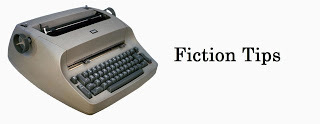
Hey, guys. Here's the start of a few posts I'm going to be doing. Just some things I've learned--and have taught myself--regarding word choice, sentence length, paragraph structure, scene structure, and a super-neato introduction to what I call prose flow theory. (Schmancy, right?) Originally, this was going to be included in one of my classes but got cut for time. I still believe it's a pretty great handful of learnin', though. So now, in a way, you get to be my student. Yippie beans for you, right? No assigned seats, just don't stick your gum under the chairs please, thanks.
1. CHOOSING THE RIGHT WORDS
Propitious.
Don't know this one? It's cool, I just learned it the other day myself. It means (per Merriam-Webster) likely to turn out well, favorably disposed, or being of good omen. One of those Magic Eight Ball words. It's good to have a decent vocabulary, absolutely, but don't make your readers go running for the Dictionary every few lines. Your prose should match that of your average reader's vocab, if such a thing can be calculated.
EXAMPLE TIME! Are you composing a smarty-pantsed 1,000-page doorstop about manic-depressive scientists mucking about with string theory, that, while enriching in its own way, kind of reads like a textbook? Okay, then go ahead. Throw in some ten-cent words. Alternatively, are you writing a fluffy romp that you want your reader to rip through the entirety of over a day at the beach?
Then don't put speed bumps in there then, ya goof. Who brings a Dictionary to the beach?
Side note. That's not to say either is greater or lesser. There is high brow literary fiction and commercial fiction and numerous branches coming off of both, yeah, sure, but those are really just categories we humans dreamt up because, without any need to do any of that hunter/gatherer stuff anymore, we have time to slap labels on things unnecessarily. Books are books, words are words, quality is subjective, and there's no such thing as a guilty pleasure if a person has even a modicum of an idea of who they really are.
Sorry, good teacher mode from here on out.
Point being: Most advice e-dispensers on the Internet like myself will tell you you shouldn't write for anyone but yourself. And yeah, yeah, sure, that's true enough, but let's be frank here a moment. No one puts a huge amount of time and energy into writing anything unless they want to see it published.
And if you're writing with the intent of being read by anyone else besides yourself, you never are actually writing for yourself truth be told. But--let's brake a moment--you should write as if you're writing for yourself in the sense that you are creating a book that is, ideally, something you would want to read, right?
So, really, when you think about it . . . you, yourself, are the target audience of your own book.
BWOMMM.
(Why, yes, that was a super-tired Inception joke.)
With that in mind, while writing, did you have to go and find a new word you didn't know just to squeeze in a bit of "Look Ma, I is smart after all" into your novel? It's okay, we all do it. Just, from this point forward, stop. If you don't know it, your audience (that is you, remember) won't be impressed.
Tomorrow, we're going to be covering diversifying sentence length for optimum interest and flow and how to write a killer query letter. Hold on to your butts.
You can also find me elsewhere following any one of these linkie-loos:
Follow me on Twitter: MegaDeluxo
Like me on Facebook: Andrew Post - Author
Patronize me on Patreon
Published on July 30, 2014 07:58
July 29, 2014
Fantasy Writing - Quick Tips
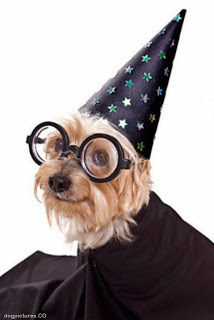
Hey, guys. This here is a rough-and-dirty guide to fantasy writing. Bits of things I've learned, my thoughts on the genre as a whole, some anecdotes and whatnot. I'm not going to circle any one particular aspect of it for too long for your skimming benefit. Feel free to comment, share, tweet to your little hearts' content. Take care, love you, and keep on writing on.
FANTASY IS, LIKE, SO HOT RIGHT NOW METHINKS
Dragons, swords both short and long, fair maidens, clanking armor, charging steeds. Epic yarns of heroism, enormous battles, soaring lush landscapes, magics both light and dark, haunted castles, dastardly sorcerers, wizened wizards. We love them. Ever since Tolkien reinterpreted Nordic mythology with The Hobbit, fantasy fiction become a mainstay in pop literature. And it's huge right now, thanks in part to HBO's wildly popular Game of Thrones series and video games like Skyrim, Dragon Age, and Dark Souls. I can't even tell you how many new fantasy series, both as TV shows or movies or as paperback and ebook, are debuting next year. It's a lot, let's just say that. If vampires were the hot ticket item a couple years back, fantasy is definitely the thing now.
FANTASY'S FLEXIBILITY
And because of that, a lot of writers want to write their own tales, adding their own take on the genre. Which, since wonderfully enough, fantasy is immediately open to adaptability and interpretation. Don't believe me? Okay, well, here.
Pop Quiz. Tell me: are elves super-tall and blond, or short and squat and live in a tree, baking cookies all day? Are trolls huge walls of angry meat, or small, blue, lithe, and tusk-toothed? Answer: yes to all.
WE ALL KNOW IT
You can do whatever you want with your version. Because fantasy, unlike sci-fi, has a wide base of what I call shared knowledge. You don't have to explain what a caravan looks like--if you don't want to. Conversely, with sci-fi, there's a lot of explaining needed. Which, don't get me wrong, people love. With Knuckleduster , it was a lot of fun coming up with carotene lenses and explaining how they work (and then seeing people argue online about how this is possible and/or not possible). Some readers will complain there's not enough info dumps and jargon. Some will say there's too much. You can't please everyone--and that's a blog post for another day.
But that's sci fi. With fantasy, that shared knowledge is there and immediately half of the explaining is done for you.
Quick Example. What's a proton laser look like, sound like, and do? Okay, there's a paragraph dedicated to just that. Now, on the other hand, what's a battleaxe look like, sound like, and do? Oh, what's that? You don't need even a single sentence to expand upon the facets of battleaxery? Yeah.
YOUR WORLD, YOUR PEOPLE
Pick up any twenty fantasy novels by newer authors and you'll often see a bulk of them start out describing the land in which their story is set. Rolling hills, chimneys, the odd hay cart, dirty faces, etc. And that's great, but where are our characters?
Elmore Leonard, known in my household as Saint Leonard, said that you should start with the people because while intricately-wrought, highly eloquent descriptions of rain can be pleasing, your reader isn't picking up your book to learn about the adventures of storm clouds. (Or are they? If so, give me a link to your book about hero storm clouds ASAP, I wanna read it.) Otherwise, they're here for the people. So start there. What are your people doing, what are they thinking? Better yet: what are your characters wanting?
SHAZAM, CONFLICT
Get your characters moving in a direction, toward something, anything. You know what someone sitting still thinking about stuff is? That's right, boring as dirt. Have your character leave the house, ask someone for something they deeply desire. A fair maiden's hand in marriage, a cup of orange juice. Have that person they approach tell them no. Have someone else say hey, I'll help you but only if you help me. Adventuring ensues. Boom, story.
NO ONE IS STATIC
Something I learned from one of my personal heroes, Jeff Smith, creator of the amazing Bone series: Any state your character is in at the beginning of a scene, they should be feeling something entirely different by the end of it.
My addition to the advice: Don't just go straight across the spectrum from sad to happy or meh to enraged. Mix it up. But never have your characters remain in any one emotional state for longer than a couple of scenes at max. They'll start to seem cardboard-y.
Think about even the most stoic, hard-bitten characters in literature. The silent, cloaked, sword-for-hire type of guy. Even he, although with a constant stiff upper lip, will have his emotional state changed throughout any scene (and numerous times per book). You remember him as hard-edged and quiet, but when you go back, he was shifting moods as often as the other characters. Another example of this: The Dude from The Big Lebowski. You remember him as being laid-back and being all, "The Dude abides," but he's freaking out about one thing or another almost constantly throughout that movie. You don't need to have your characters FLIPPING THE FLIPPING-FLAP OUT all the time, but some shifting one way or the other is good--even if they do retain that die-cast furrowed brow like our becloaked sword-for-hire.
R-R-R-R-REMIX!
One man's total reinterpretation and revitalization of a well-trod genre is another man's hacky rehash. I can't tell you how to be original, you have to figure that out for yourself. When I was working on Fabrick initially, I wrote down the things I wanted the story to have that would set it apart. I wasn't forcing the individuality of my story, keep in mind, but I was letting new spins come to me organically.
This list included 1.) a group of heroes, working together. 2.) The group made up of nothing but side-kick types, the B-story people, no Joseph Campbell standards. (While Clyde does go through the Hero's Journey, admittedly, when he learns he's in line to take his father's place on Geyser's throne, even he's surprised about the fact he could ever be anything more than a conscience sponging servant.) Next, 3.) a setting unlike anything I had ever seen before.
It's fantasy, but there are TVs and cars. There's magic, and there's space ships. It's on another planet, but at one point a strange place called Europe is mentioned.
That last thing totally threw one of my readers for a loop. They all but demanded I include in the next book an explanation on whether or not Fabrick takes place on a much-changed Earth, a planet near Earth, or what. "How do they know about Europe?!?!?!?!" I believe the quote went.
So you're probably wondering, did I do this on purpose?
Heh. *shrug and smile* Maybe.
My point is, the minute your readers have you pinned down and know what to expect, you've lost them.
Sure, some will stay with you because your work is comfortable and you can provide an escapist safe haven for them, and while that is fantastic--why I read Brian Jacques as much as I do--it's not dangerous.
Do you want to be dangerous? Well, those leather pants in your closet says you did once upon a time. Why not now, in your fiction?
Fact of it is, despite what reality TV might be heavily implying, people are smart. Well, people who regularly read are anyway. And those fine, beautiful people want to be challenged, surprised, and sometimes even confused. Really. Think about ten of your favorite characters of all time. At least one of them in there you're not sure if they should be classified as a good guy or a bad guy. Quite possibly it's why you like them in the first place. Maybe they're both, maybe they're secretly one but posing as the other.
Mystery, as it is for relationships, is vital for continued interest.
Quick Tip: For every card you lay on the table, sneak another up your sleeve. Every time the reader has been made to be comfortable with a place in your story (they're recovering after a fight, etc.) or you've just revealed something about one of your champions, introduce another mystery right away. Surprise them. Kill somebody off. Someone likeable, preferably. Give it the ol' George Martin.
R-R-R-R-REMIX, PART II
Don't give them the standard fantasy stuff.
That's been done. Done to death, in fact. That dead horse has been so beaten, it's starting to pop out on the other side of the globe by this point.
And while letting the shared knowledge thing work for you, give the story-o-matic a good spin, maybe a few spins to really get things good n' screwy. And not just make the good guy the bad guy or some such nonsense. I mean really mix it up. Hey, what about a wizard with an AK-47? How'd he get it? I dunno, that's your job now. Explain it, don't, just run with it. (That's a poor example, FYI. You can do better than that, I know you can.)
Oh, oh, I know! Have your characters, despite being clad in armor and bodices and everything, speak in cool urban slang. Instead of warring houses, have it be they're fighting over turf. Like West Side Story and Rumble Fish meets The Wheel of Time. Oh! And they have steam-powered boom boxes, right? And instead of jousting, they have single combat break-dance-til-yer-dead competitions. Ahem. Sorry. I could go on but I'm not giving any more ideas out for free here.
My point: if you're going to write fantasy, do, but write your fantasy. I don't want to read that other person's book, I've already read that. And while I dug it, now I want to read your book. If I wanted to read that other person's book again, I'd just do that.
YOU CAN ALWAYS TALK TO ME
Hey, I'm in the same boat as you. I struggle for ideas, I sometimes have ideas and then forget them (that's the worst), sometimes I have bad ideas. But you know what, we're all in this together. If you want to talk to me about your stories, or if you want some feedback, I don't charge, nor do I bite. Want to message me? Go ahead, the little box is right down there, go for it. Tell me, ask me, anything you please.
You can also find me elsewhere following any one of these linkie-loos:
Follow me on Twitter: MegaDeluxo
Like me on Facebook: Andrew Post - Author
Patronize me on Patreon
Published on July 29, 2014 13:07
July 3, 2014
Please, patronize me.

Recently, my creative life was hit by the equivalent of a flat tire. Which, for most, wouldn’t be any big deal. But, the thing was, metaphorically speaking, not only had I been drinking and driving, but I was also in the middle of the desert. I wasn’t present in my own life, and I was missing the good parts by only focusing on what was wrong. I’d been published, semi-favorably reviewed. My books were out there, being read. I was meeting people online and in person, and I even had a friend of mine, in public, break down when speaking about how she was moved when a certain character in Fabrick died. She was mad at me, but said she loved the book. I had affected someone with my art, and in turn, I too was moved. I surprised myself, because I didn’t think I was capable of doing that. And I was missing it, letting it roll past me with only a glimpse and a faked smile of acknowledgement.
-
I was an idiot.
-
Because, not too much later, just this spring, when submitting the packet (the first three chapters and synopsis of the plot) to the third book in the Fabrick Weaver series, I was told that the sales of Fabrick weren’t hot and my publisher would not be completing the trilogy. I was assured it was a difficult decision, and I believed them. I’d grown close to my editors and staff. I know all their names, our email exchanges are on a first-name basis. Although I didn’t talk much about it—with anyone, not even my closest friends—I kind of tumbled head-first into a rather . . . not-good period.
-
I realized that not only had I missed the good stuff when it was happening, letting it slip right past me, but I was also now deep in the actual bad time and I hadn’t appreciated the good when it was right in front of me—and now the bad was all I had.
-
I had another book due to come out though. Everything would be okay. I’d market the hell out of that new book, and that’d pull me out of this lurch. Heh. The press that had taken on that second book fell apart. The guy behind the helm—who shall remain nameless—shut down the press without even so much as a word to his employees. The book is still under contract to be published, three months ago. I’ve been trying to get the rights back, but to little avail. But at the time, learning that not only the third book of my trilogy wasn’t going to happen but the other book I had coming out—and had people excited to pick up, made a Goodreads page for it and everything—wasn’t going to happen.
-
I decided I’d stop writing. That I’d take these events, coming in such quick succession, was a hint. I wasn’t made for this. I didn’t have thick enough soles to tread these here coals. I began putting my efforts elsewhere.
-
A few weeks passed and I was feeling pretty blank. Like I was going through the motions. In my non-writing life, I do a lot of temp jobs. Volunteering and non-profit stuff. All temp, all entry-level, all non-commitment. In my spare time between, I’d take notes normally. On stories, maybe a snippet of dialogue that’d spear me from out of the ether. I wasn’t, and in my spare time or days off, I was doing nothing. Nothing. Sitting around, reading books I wished I had written, growing green with envy anytime ANYONE got a boost in their career. I un-friended people from Facebook left and right, stopped following people on Twitter, thinking these petty little revenges would make me feel better. Nope, I just felt like a dick.
-
I can do nothing else. I write. I come up with stories—or, rather, they come to me and I work as their filter and transcriber. I was taking notes again, all the time. Ideas were coming to me in floods, and I started putting them down on paper. I didn’t care that no one was getting back to me about jobs or writing projects or even freelance writing assignments. My email inbox remained a ghost town, and I was okay with it. I was doing my own thing, writing again.
-
I decided I'd undo the ropes holding me to the anchors. Because you can move while anchored, sure, but you’re just going to end up going in circles. And boy howdy was I. Looping over and over about things I couldn’t change. I couldn’t make people want to work with me. And in the end, I was letting the most important thing become neglected: the writing itself.
-
I can't give up, especially not on Clyde, Nevele, Flam, and Rohm. Their story needs--and still needs--to be completed. I owe it to my friend who cried in public--depiste how crowded it was at that bar that night--saying how upset she'd been, and how moved by my writing. She'd grown attached to that character, and I owe to her--and everyone else who fell in love with my characters--a fitting ending. I write, it's what I do. What else can I do? A semi-bad Gollum impresson. But after about three seconds, that gets pretty tiresome to be around. Unlike my books, hopefully.
-
I want to finish the Fabrick Weaver trilogy. And with your help, I can do that. Honestly, I need your help doing it. And I want to write other things too. I want to continue pursuing traditional publishing routes, and if and when I ever get big enough to not need grassroots support, I will gladly turn your money away. But not you, not you-you. Anyone who helps me, I’ll never forget them. I cried over five bucks yesterday, someone gave me through Patreon. Five bucks. From a friend whose work I greatly admire, and hopefully my work is something he admires too. If he asked for five bucks, or more, I’d gladly give it. If I didn’t have it right then and there, I’d pawn something or find some way to get him what he needed.
-
I know which way I’m going now. I’m in the trip, with eyes open, fully present. I just need a breeze to keep me going. And that’s why I’m asking for your help.
-
If you go over to my Patreon page, you will see what helping me will get you, in return. I know a lot of you don’t want anything for help, but trust me, it’d kill me if I didn’t give you something at least. I’m not begging, but I am asking. Without shame, without pretending or exaggerating. I want to continue to do this, and I only can with your help.
-
Thank you,
-Andrew
Published on July 03, 2014 10:42
October 7, 2013
Bonus Disk: Knuckleduster
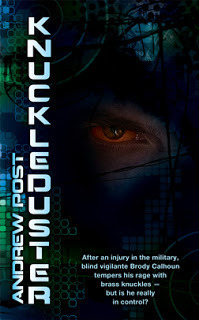
Even though getting your story fix with ebooks is rapidly becoming a popular thing if not the downright main way people get their content, I wish more books worked like a DVD. You go see a movie in the theater (or at least this is what I do) and immediately you're wondering what special features the DVD will have. I love behind-the-scenes stuff. Besides coffee and jasmine rice (not combined), random trivia is a major food group to me.
(Update: Some presses do a P.S. thing at the end, with an interview with the author and previews of the next installment in the series or another author's similar work. Still, to me, this does not quite cut my trivia feverishness.)
So, for other of you trivia nuts, here is the "special features" for Knuckleduster. Spoiler alert in full effect, by the way.
1. What's in a name?
Knuckleduster didn't have a title until about a week before I started sending it out to small presses who take unsolicited submissions. It was Hard Wired for a while, but I never really liked it. Finally, I had it. And then it was changed again, since Knuckleduster: Project Silver Fox was too wordy--and a bit like a Harry Potter title. I still have the contract that features that as the title that was acquired by Medallion Press. Strange, since I only see it as Knuckleduster now.
Brody's full name is said toward the beginning, when he's being released from the police station. Broadwell Alexander Calhoun.
Broadwell will be covered later on, down below, but when doing research for Knuckleduster, I heard "Brody" as a term meaning "instigating a fight." They might've been saying "brawdy" I'm not sure, but either way it stuck.
Alexander is a reference to Alex from A Clockwork Orange by Anthony Burgess. The distopic novel was a major influence on me. The reference to A Clockwork Orange continues with the plot, Brody being essentially programmed to be one who resists, holds back, when his true nature is much more violent. Also, Brody's carotene lenses stain his eyes, yes, orange.
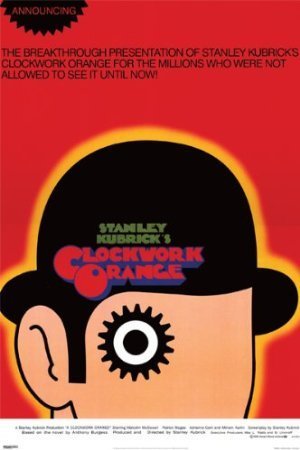
Calhoun is the name of a pretty popular lake here in Minnesota, centrally located in Minneapolis, for its beaches and hangout spots. Brody is from the Twin Cities area, and even though it hasn't been mentioned yet in the storyline, he is the (fictional) descendant of the man who the lake was named after, John C. Calhoun, a real person. Perhaps having an ancestor like John C. Calhoun, a man who was an advocate for slavery, Brody's determination to be a good person has been cemented, a part of him trying to cleanse the Calhoun name . . .
The Siblings Ashbury.
Thorp's name is a reference to one of my author heroes, Roderick Thorpe. You may not know his name because a majority of his work is now out of print [correction: a lot of his stuff is now back in print, as of 2012], but I'm sure you know one of the movies that was an adaptation of his novel Nothing Lasts Forever: none other than Die Hard. I read Nothing Lasts Forever when I was in middle school and it made me want to try my hand at more actiony fare featuring a hero-against-the-odds than the Resident Evil-inspired horror short stories I'd been writing. With his sister, Nectar, there's a lot of allusions to insects in Knuckleduster and Nectar's name was meant to inspire something that's to be pursued, something good and pure and worthy of fighting to find.
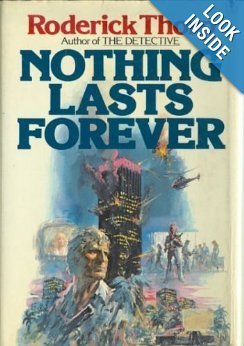
Ashbury being a reference to the district in San Francisco, Haight-Ashbury, which is known for its number of hippies. With both Nectar and Thorp having the last name, it was meant to hint at their seemingly opposing viewpoints on the military. Thorp, although proud of having been in the Army, hates his past and hates the idea he was tricked into going to war. Although he wouldn't admit it, he truly is right in line with hippie beliefs, although he'd probably call it be another name. His sister, Nectar, is a dedicated subscriber to hippie culture, having cracked the idea of going after Hark Telecomm at her place of work with her fellow protestors at Mother Nature's Womb.
Even the serial killer on the loose in Chicago, Titian Shandorf, is a dual reference. Titian is another name for orange, or another hue (okay, I don't know how it works with colors), which is meant to reflect Brody and his orange-stained eyes and hint at a connection between them being like two sides of the same coin or what Brody could become. Shandorf is a reference to the lead singer of Monster Magnet, Dave Wyndorf, a band I listened to a lot when I was writing the original story that'd later become Knuckleduster, way back in the 90s. Speaking of which . . .
2. Unlikely Origins
In the mid and late 90s, I started writing. No real objective with it, but just writing for the fun of it as you do as a kid. I came up with a superhero character, the Hunter, who wore body armor in not-at-all-stealthy black and yellow stripes. Like a giant bee. A giant bee with guns. He was like the Punisher had a baby with a hornet, and it was the Hunter. Who lived in a helicopter. Yeah. It was as silly as something a kid who grew up on action movies and reading Spawn could've come up with. Later, when thinking I could maybe (with some heavy editing) use the Hunter in some way, I began taking the character apart and seeing what I liked about him the most. That being that he had cybernetic eyes that allowed him to see in the dark, only having them because . . . well, I never figured that part out. He was blind without them, that's all there was to it. The Hunter, you see, had no back story. He was just a dude who dressed like a bee, had a crap-ton of guns, and lived in a helicopter. I was like eleven, all right? Anyway, coming back to the character, I liked the blindness aspect but didn't want to go that sci-fi with having full-on cybernetic eyes and thought of what, if anything I ever wrote, could be done with real science. My brother in law, at the time, was just starting to come to terms with the fact that he was going blind. And I wanted nothing more than for the doctors to find some way to allow him to see, surgical, medicinal, or otherwise. I still want carotene lenses to be a thing.
So I peeled away the superhero vibe, the helicopter house (sigh, sad to see it go) and applied that to the idea I had about a character that did bad things but never tried to get out of them, someone who accepted all badness he perpetrated, but only on the surface. Really, inside, he'd done other bad things that even he couldn't remember. Boom. Brody.
But I didn't know what to do with it. I had a character, or a rough draft of one, but nothing else. Setting it aside, I started getting into noir and detective stories, reading a lot of Dashiell Hammett. I started a short story completely unrelated to what would become the rejiggered Hunter, about a guy who between shifts washing dishes at a chain restaurant solved missing persons cases plucked from that board they just outside all Walmarts. Truth was, he was suicidal but deeply religious and didn't want to die by his own hand but instead dive headlong into these cases with no regard for his own wellbeing, which would make him the ultimate nightmare for any kidnapper. I'm up-selling it here. It sucked. But I liked the suicidal detective, scraped off the religious aspect (since I couldn't write it convincingly enough not being a religious person myself whatsoever), and then set that aside as well.
Liking to combine ideas, taking two seemingly unrelated things and trying to Frankenstein them together, I began mind-riffing on the idea of the blind superhero-who's-not-a-superhero and the suicidal detective-for-hire being the same person. Huh, I thought, I might have something here. I just didn't know what.
3. Not a Sci-Fi Writer
I wrote some sci-fi before Knuckleduster, but nothing I really liked. I believe all writers, being totally frank here, for every one good book in them, they have three crappy ones. If not completely crappy, at least in need of major reworking and years of drawing board-ing. When I started taking writing seriously, trying to get short stories out there and send around some manuscripts I'd been tinkering on, it'd all been literary fiction. Or, to be more specific, quirky literary fiction. And even more specifically: Dark, quirky literary fiction. I wrote a story about a man who talks to his hemorrhoid. A crime scene photographer who comes upon a woman who's face was eaten by her cats. More than a few about drug addicts doing stupid, drug addicty things. All very much grounded in reality--aside from the flights of fancy with those drug-dabblin' dudes. And the hemorrhoid, for those keeping score, wasn't actually speaking, it was the guy struggling with the things in his life he couldn't actually control. Okay, so yeah, maybe a heightened version of reality.
I'd also done some screenplay writing, which was going nowhere. Met some people, entered some contests, had a few people show a mild interest in more of my stuff, but I was beginning to hate the movie industry, even the independent scene. This was something that remained with me for quite a while, all up until I met someone that changed my mind about the entire thing just last year, someone I'm collaborating with currently, actually, on a cyberpunk short film no less! But, for a long time, became frustrated and eventually burned out on screenplays and decided to go back to writing fiction. It felt right.
I've always got at least one or two books going. Look at my night stand and the lamp is practically in a small fort of books surrounding it. At the time when I was thinking about combining the suicidal detective and the reworked, more realistic Hunter character, I was reading a lot of cyberpunk as well as the Dashiell Hammetts. I was getting closer to returning not only to fiction, but also science-fiction, I just didn't know it yet.
My dad got me into sci-fi. Whenever Mom worked late and it was just he and I, we'd rent Robocop or Terminator. Alien and Aliens becoming a particular obsessions of mine, even though they scared the crap out of me. Predator, another. All of those 80s super-gorey action flicks that combined horror and sci-fi, with a heavy dollop of ultra violence. These films, even though they probably mentally scarred me, were a major influence on Knuckleduster. I've always wanted to jump into sci-fi with both feet. Why not now? I'd use what I'd learn of writing disturbing flash fiction and expand it while simultaenously leaping head first into science fiction with no idea whether my clunker of a Frankensteined story idea would spread wings or get 10s across the board in the face plant category.
Lesson here, speaking with 20-20 hindsight, is if a project feels safe, don't bother writing it. If it feels like a sure-fire winner, again, don't bother. If it scares you, if there's a better-than-good chance you'll crash and burn . . . well, strap in and chase that sucker down. Means you're onto something.
4. Weapon of Choice
Brody's personal brand of street justice is made with a set of brass knuckles. I wanted him to have not only a zippy nickname, but also something that made him synonomous with something, like Indiana Jones is with a whip or Spider-Man is with incessant constant belly-aching about Mary Jane. You know. Can't have one without the other. So, I thought for a while what would not only be a good contrast against a sci-fi setting full of gizmos and doo-dads, something very analogue and blunt and almost archaic, but something, when seen, immediately makes people raise their hands and back away. Yeah. Brass knuckles sure tend to do that. They're scary, at least to me.
Expanding a little here on this topic, and this is kind of a personal family story, but I'll share it with you because you're nice and omit the names for fear of my mother sending me a rather scathing email later on. See, one side of my family comes from a rather rough-and-tumble sort from the deep South. And I mean deep South. In my ancestry, I have more than one family member who was tried for horse-thieving. Yeah. And, as times advance and families adopt to the new ways of things with each successive generation, some (not all) of my family members continued with this outlaw mentality. Guns to a house in the deep South are like that Magic Ninja blender thing in affluent "Yankee" homes, so that goes without saying. But brass knuckles, switchblades, and the like, those for a long time were perfectly legal. A-okay to own and carry, because they . . . well, at the time, weren't considered anything more than personal defense tools. Then the law got passed and all brass knuckles and switchblades had to be either kept at home or destroyed. Completely illegal to own one whatsoever and if you got caught with one (not even using it), it was a felony. So a member of my family, who was rather fond of brass knuckles and had a somewhat large collection of them (especially since you can only wear a maximum of two sets at any given time), had no idea what to do with them. So he bagged them up and dropped them down a well. I was never allowed to see them, or hold them, perhaps for fear of any lingering DNA on them, but I always thought about that well and how at the bottom, in a burlap sack, eight to ten sets of brass knuckles lay down there, buried, forgotten, hidden . . .
Hmmm. Maybe that was a bigger influence than I thought . . .
5. Other Influences
If you follow me on Twitter, or have read this blog in the past, you've probably picked up on the fact that I'm a bit of a gamer. Video games, oddly enough, have become a major source of inspiration to me lately. If not directly inspired from a game's plot or story mechanics of the one I'm playing, I might get ideas completely unrelated to the game's genre or vibe simply because gaming for me is a great brain-degreaser. It channels something, I think, for me at least, that lets me think creatively and simmering ideas can go on in the background while I'm saving the world from aliens on screen in the foreground.
Knuckleduster, though, was largely influenced by one game series in particular, though. Deus Ex for the PC (and later PlayStation 2) was enormously eye-opening to me when I first played it. Not only because of its (then) amazing graphics, but because of the story it was telling. It was gritty, bold. It felt like a real world with real problems, and the science fictiony things were conveyed on a human level. It wasn't walking tanks or space commandos battling hordes of evil zombies or aliens. It was people versus people, with convincing motivations and backstabbery and intrigue and conspiracies. So good.
I've mentioned using music as "mind keys" for writers before. Taking a song that fits the vibe of your work-in-progress and only listening to it when working your fiction until the two develop a glue between them of sorts where one will remind you of the other and vice-versa. I've been doing this for a while now and it has yet to fail me. I'll do Bonus Disk posts on all of my books after they've been out for a little while, and share these songs for each novel. But, for Knuckleduster, the "mind key" song has always been the cover of Radiohead's "National Anthem" by the Yoshida Brothers.
http://www.youtube.com/watch?feature=...
Since finishing up the edits for Knuckleduster, I have yet listened to this song again. Even as much as I love it. I avoid it when I put my iPod on shuffle, because the only time I listen to it again (and again and again and again) will be when I begin work on the next Brody Calhoun book.
And with that, I shall bring Bonus Disk for Knuckleduster to a close. If I happen to think of any more factoids, I'll be sure to update. But until then, thanks for checking out the first edition of Bonus Disk.
Published on October 07, 2013 11:23
April 22, 2013
Survival Revival
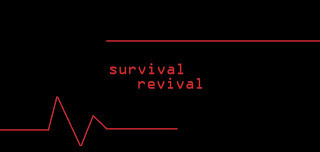
Earlier today, IGN released news about The Evil Within, a Bethesda-published survival horror game directed by the father of the genre, Shinji Mikami. The man responsible for Resident Evil, Devil May Cry, Vanquish, and a few other survival horror titles he's probably leaving off his resume, like the highly-divisive Dino Crisis.
Last week, I saw the headline about The Evil Within. At first, I shrugged. Because even though I saw it is be a survival horror game, in the past few years a lot of titles have attempted to claim their title is of the subgenre only for it to be something more akin to a standard action game with a vanilla horror vibe to it. Resident Evil 6, for example. (And even though I'm a Dead Space mega-fan, I was still trying to get the taste out of my mouth of Dead Space 3, which in all honesty, turned out to be more like DLC Space 3.)
But I didn't want to jump to conclusions, especially since Mikami's name was attached. I watched the trailer . . .
. . . and immediately knew this was not going to be any diluted action title masquerading itself as survival horror. This, if the game itself turned out to be anything remotely similar in tone or feeling to the live-action trailer, was going to be a throwback love letter of the greatest proportions; something that truly captures what survival horror has been lacking for so long. And I simply cannot wait to pop in The Fear Within's disk, plug in my headphones and crank the volume, shut off the lights, and try my best not to scream out loud when things get spooky.
Because survival horror and I go way back.
- I remember I bought the first Resident Evil on a trip to Pittsburgh with my dad. This being back when you visited a FuncoLand, there'd be adverts for coon soon N64 games on the walls. Yeah.
- I'm old enough to remember seeing the first preview screenshots of Resident Evil 2 in Gamepro, God-only-knows-how-long-ago.
- I bought the original, PS1 classic Silent Hill the week it was released. And for several days following, slept with the lights on.
Putting it simply: I loved being scared equally to how much, now, I miss, and want to be, scared now, again, at 20-something.
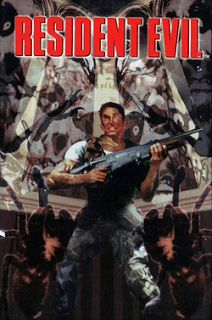
Oh, the 90s. Bruce Campbell references were not just begrudgingly tolerated like they are now, but warmly encouraged and appreciated.
And I continued throughout the 00s to stay faithful that the franchises that I loved for the visceral spine-tingling they could so generously provide would get back on their feet. Silent Hill 2 remains one of my all-time favorite games (regardless of genre), and pretty much after that, it's been a slow descent into either two camps: the action-laden trajectory Resident Evil took ever since 4 was released on GameCube in 2005; or the RUNAWAYRUNAWAY approach with the likes of Penumbra, Amnesia, Silent Hill Shattered Memories, and the abundance of Slenderman-inspired games.
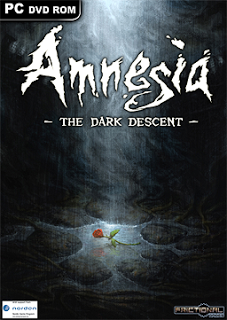
Imagine the day when PewDiePie and Amnesia first met. It must've been magical.
And there's nothing wrong with the latter, really. It's just not survival horror in the definition I know it as. It's more of straight-up horror, really. No weapons, just picking around from one room to another tracking down keys and trying to avoid getting seen. Again, don't get me wrong, I love that kind of game--as it's own thing. It's just not survival horror. It's more like stealth-horror.
I want--nay, crave--having to get anxious about heading into the next room, knowing I only have x number of bullets, trying to just dash past enemies to conserve resources, getting cornered and having to just try and spam my way out of a situation, eyes closed, just hoping for a lucky turnout. I want a character that's not an anthropomorphized Abrams tank who's so well versed in firearms he uses a Glock to flip light switches at home and a shotgun to turn the pages of his newspaper while on the can. No. I want a weakling, a nobody, someone who abhors violence and can't even sit through Die Hard without getting squeamish.
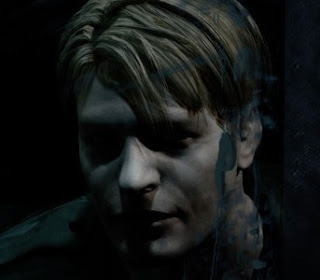
"You rang?"
That's survival horror. Even if it does involve silly things like going to the police station, moving around statues, finding keys in toilet tanks, having to use the super-charged MiracleGrow to make the plant in the sheriff's office grow enough to move aside the ceiling tile so I can get up there (after pushing a ladder all around the room to just the right spot), find the serpentine belt up there for the jeep down the street so I can use its winch to move the semi-truck off the shoulder of the road because it's blocking the lock box submerged in the mud under it that contains a key card to the police station's observatory where I have a lens for the telescope, and use said telescope so I can see where, one town over, the smoke is coming from a rooftop where perhaps it's a signal fire my friend lit who is in need of help.
That's okay. That's just part of it. It's like Hermione giving Ron shit about something. It just wouldn't be Harry Potter without it, and survival horror just needs the goofy quests to be survival horror--okay, maybe not to the degree I'd detailed above but you get the idea.
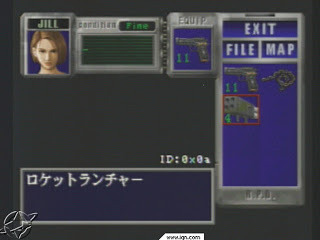
Another thing being the incredibly limited inventory. Which I always thought was more realistic. Some games allow you to carry scads of guns at a time, which if you had to wear your inventory on your character's model like some games, you'd end up looking like you were bristling with firearms, like a hedgehog as designed by Smith & Wesson.
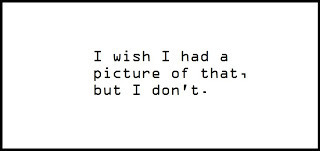
And here's hoping The Evil Within, if it is to be a return to classic survival horror as it's being promised, where I hope it delivers. Already, from what few screenshots and hearing Mikami talk about the project, I have hope. But I could see it turning into Suda 51's Shadows of the Damned as well. The thing I would stress the most--if Mikami is out there, seeking obscure science-fiction authors' opinions on things--that it's crucial to not be afraid of staying serious. Even though Silent Hill is loaded with laughable dialogue with its frequent deadpanned deliveries of "Is this really happening?" and "What are those things?", it's important to never have a character laugh off any of what's going on around them. If the character is taking their situation seriously, the player will as well. And survival horror should be a continuous stretch that operates like a loop of Alien's final minutes. Alarms going off, flashing lights, the thing is out there somewhere, Ripley's struggling and confused and terrified . . .
Because survival horror is more about fear than empowerment. It's about being clever, using what's given to you precisely when it needs to be used, no more and no less, and knowing when to run, when to fight, and when to change the sequence of verbs you're listing so to avoid accidentally quoting a popular Kenny Rogers song.
Isolation being another major thing that classic survival horror games relied on. Silent Hill had you completely alone for vast majority of the time. You didn't have someone to call and FaceTime with to help you along or save your progress. In the first three Resident Evil games, you'd run across friendlies from time to time but usually it was a quick bit of exposition and off they'd go, leaving you to plod along all by your lonesome once more. And this is where the stealth-horror titles really get it right, with putting you completely solitary in a locale, with a lantern and maybe a map. And it seems with The Evil Within screenshots, the protag is just him, a gun, and the baddies. Because, shocker, what more do you really need? Having someone gab in your ear the whole time on updates, or an NPC right beside you blowing through ammo and getting themselves killed is the opposite of survival horror. It's more like incredibly loud baby sitting.
Honestly, I don't know which is worse: When they run around emptying entire clips into enemies that only need one headshot to dispatch or when the NPC can't defend themselves at all and the best they can do is shriek, run to a new spot in the area, and shriek again.
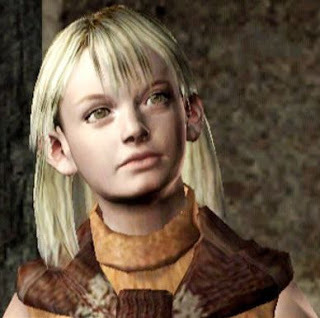
I'm not naming names or anything, but . . .
Survival horror had to change with the times, yes, it had to adopt to fully 3D environments, it had to rejigger its play style for a modern audience, it had to do a lot of things. And during that time, it lost some of its magic that was somewhere between the polygons. The tank controls from Resident Evil: sure, that can go in the do-not-repeat bin. The sea sick camera of Silent Hill, like the camera man following Harry Mason on a dolly crane was pretty well sauced: yeah, toss. But some of the elements, the inventory, amount of ammo provided to the player, the tension, the sound and music, those are the things that don't need fixed because they were never, ever broken. Make them more intuitive, give 'em a good polish, but don't try and put wheels on a cabbage--
That's right. Wheels on a cabbage. I went there.
--because it doesn't need them. Survival horror needs patched up, so break out the Green Herb or the Medical Spray or the Medium Health Kit. Just don't give it more guns and Muscle Milk. Because, we all know how that turned out . . .
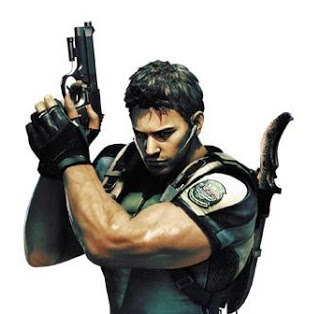
"Oh, you haven't gotten your ticket to the gun show yet?" (BAM.)
More on The Evil Within:
Official site.
IGN's First Look Article.
Joystiq's piece on the title.
Published on April 22, 2013 11:06
April 11, 2013
Also Recommended: Gamer Update

Hello there, Andrew here with a mid-month Highly Recommended, of sorts. This is an all-videogame edition, so if you're not a gamer, I'd suggest moseying on since it's about to get awfully nerdy up in herr.
Lately I've gone through somewhat of a gaming dry spell. Tends to happen sometimes when you've caught up on the releases you were anticipating, finished them, and nothing new (or old) is really jumping out at you. I'd just completed Borderlands 2, with friends, and since we had pretty much played that game to death, I was ready for something non-shootery. Open up my gaming trunk (which isn't as cool as it sounds--it's really just a repurposed ottoman with a space inside for blankets and such) and I see I've amassed nothing but shooters lately. I stared down into the catalog of games and thought aloud, "How the hell did that happen?"
So, I took a trip down to my local Gamestop, dug through my favorite spot in the store (that corner where there's just this weird-smelling bin of games that don't have their instruction manuals, and rarely their original packaging) and unearthed an oldie but a goodie (to me): Dark Sector for the PlayStation 3.
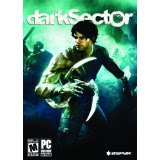
A shooter, yes, but with a cover-based shooter ala Gears of War. Completely arse story, somewhat wonky controls, but there's a few sections that're a real blast. Using the glaive to hack badguys in two or take on cyber-organic samurai guys is a real blast and the power upgrade system is doled out intelligently so that you never feel overwhelmed, or OP.
Dark Sector runs about six to eight hours. There's no collectables really, no multiplayer, no real reason for me to play through this one again outside of the heap of nostalgia I have for it, inexpliably. I dunno, I just like this game. It has that certain something I can't quite put my finger on. Not all that highly rated on Metacritic (I know, I shouldn't base my opinions on games due to what Metacritic makes of something), but I just dig it.

After glaive-ing my way through Dark Sector (yes, it's a word), I picked up Bioshock Infinite on release day. I covered it last time in Highly Recommended: April, so I won't go into it again here, just suffice it to say it's awesome and worth grabbing at full price if your budget can allow it. I'd also recommend getting it now while there's still a buzz around it, with so much speculation going on about this whopper of an ending. I'm supposing here about that ending because I have yet to reach it. I can pretty much guess, and have had a good idea of what the ending was going to be even before meeting Liz. Yes, I am gloating. I is smart, okays?
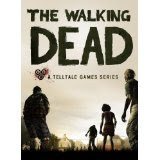
I'm kind of late to the party on this one, but Telltale's The Walking Dead point-and-click games are astounding. I can really see why they got GOTY. I was on PSN the other day, saw the first episode was free ("That's how they get ya!"), downloaded it, played it, was in awe for its duration, completed it, and immediately began downloading the second ep. Man alive. Even if just judged on the writing alone this one is a knock-out. Sure, the graphics aren't that amazing and the lip sync is pretty bad at times, but as an overall package (with writing and character development at the forefront of its merits), this game is an A+. Nay. Scratch that. An A++!
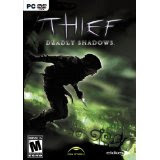
Thief: Deadly Shadows. Grabbed this one on Steam and immediately fell in love with its mood. The music here is outstanding, highly atmospheric. And as far as stealth games go (my favorite genre), this one is king. I'm loving this game. I'd always been aware of Garret and the Thief franchise, but I always got the impression that they would be way too technical and over my head. I use to be a real gaming dullard and never picked up anything more complicated than "shoot the things that move to make them stop moving, complete level, yay I'm dumb!" but recently my friend Rachel put a link up on Facebook about Thief making a return next year on next-gen consoles. And its killer trailer and breathtaking screenshots made me think, "Hey, why not go back and play the other ones before the new one comes out?" Did a little YouTube Let's Play watching of Thief II: The Metal Age, and I was sold. Grabbed up Deadly Shadows with the full intent of going back and playing them in reverse order.
But, Deadly Shadows was released just about ten years ago. This being at a time when lip sync and being able to see every damn eyelash on a character model was not only impossible but not important. Back then, story is what came first and good voice acting to make up for the blocky, puppet-like character models. And this has it (story) in droves. Told by Garret in a very noir-ish delivery between chapters really sets the feeling of the world. Garret, despite being a professional thief, is an immediately likeable character. He's endearing, hard-bitten, sarcastic. Basically the roguish you'd expect a thief character to be but it's done so sharply here that you forget every Han Solo or Jack Sparrow that came before (and after) Garret. He feels truly original, and loveable at the same time. And some of the segments where you're being chased down, dodge around a corner and hug the walls in a narrow little splotch of shadow and wait for your pursuer to give up is . . . nerve-rattlingly fantastic.
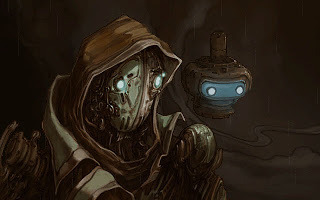
Primordia, my favorite among these, is a point-and-click adventure in the spirit of the Monkey Island games and other early LucasArts stuff. If you've played any of those, you know the routine: Pick up this, pick up that, add this to that, give this to that thing, shove that thing up a statue's nose, etc. And as much as I love that kind of you-must-think-outside-the-box puzzle solving greatness, where Primordia really shines is in its main characters, Horatio Nullbuilt and Crispin. Their banter is hilarious. I mean laugh out loud funny. And what makes it so genius is how its levered against the somewhat heavy story of creationism, how robots in this post-apocalyptic world worship Man (capitalized), even use Man as a curse word, and how, in the Book of Man, you can learn First there was Man, then there was the Code, and then Man used the Code to breathe life into Machine. But on this ravaged, muddy ball in space there are no people. Where did they all go? I mean . . . it's f***ing brilliant. Dark, brain-churning goodness. I love this game and if you like point-and-click adventures, do yourself a favor and snag this one. It's only ten bucks on Steam and worth far more than that.
Well, that's all from me. Thanks for stopping by and look for more recommendations from me in June with the standard Highly Recommended piece. Until then, encouraging writerly statement!
Published on April 11, 2013 11:06



